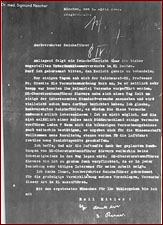
|

|
Many scientists might argue that while the Nazi experiments were nothing short of bestial, their results can only be judged scientifically, not morally; data are neither good nor bad, they are just data. Even if scientists, journal editors, and others were to judge results on moral grounds, Dr. Eleanor Singer, editor of Public Opinion Quarterly, considers it "nonsense to talk about 'enforcing ethical standards' as though these were clear and agreed-upon." Until the scientific community reaches a consensus on the degree to which ethical concerns should govern the spread of scientific knowledge, Singer maintains, "I would argue that open dissemination, not censorship, affords the best chance for developing agreed-upon principles of what constitutes ethical research procedures, and of how potential conflicts among ethical principles, and between such principles and scientific goals, are to be resolved." [40] "The most powerful argument in defense of the use of the data gathered by unethical methods is that the information gathered is independent of the ethics of the methods and that the two are not linked together. In essence, data are neither evil nor good."—Dr. Robert Pozos, hypothermia expert [41] 
References 40. Singer, Eleanor. "Commentary" (responding to "Ethics and Editors"). Hastings Center Report, Vol. 10, April 1980, p. 24. 41. Pozos, Robert S. "Scientific Inquiry and Ethics: The Dachau Data." In Caplan, p. 104. 42. Folker, Brian and Arthur W. Hafner. "Commentary" (responding to "Nazi Data: Dissociation from Evil"). Hastings Center Report, Vol. 19, July/August 1989, p. 17. 43. Wilkerson, Isabel. "Nazi Scientists and Ethics of Today." The New York Times, 5/21/89, p. 34. Photo: National Archives, courtesy of USHMM Photo Archives The Director's Story | Timeline of Nazi Abuses Results of Death-Camp Experiments: Should They Be Used? Exposing Flawed Science | Resources Transcript | Site Map | Holocaust on Trial Home Editor's Picks | Previous Sites | Join Us/E-mail | TV/Web Schedule About NOVA | Teachers | Site Map | Shop | Jobs | Search | To print PBS Online | NOVA Online | WGBH © | Updated October 2000 |
